
Cheap flights to Taipei (TPE)
Traveloka helps you find cheap and promo flights to Taipei (TPE)
Routes
Airline
Schedule
Price from
Top Hotels in Taipei
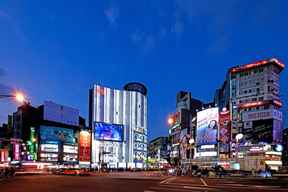
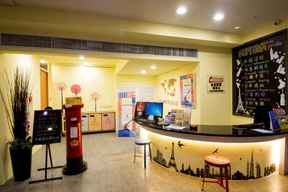
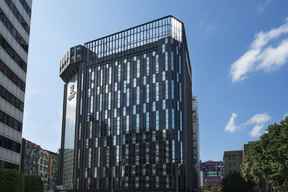
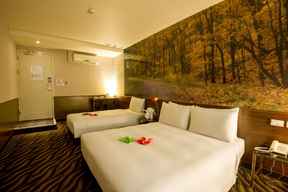
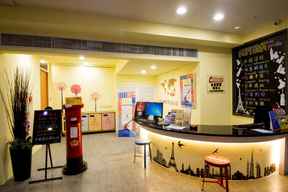
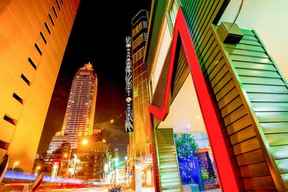
Flights to Taipei, Republic of China
Taipei is the capital and a special municipality of Taiwan (officially the Republic of China, "ROC"). Taipei is the political, economic, educational, and cultural center of Taiwan and one of the major hubs in East Asia. Considered to be a global city and rated as an Alpha City by Globalization and World Cities Research Network (GaWC). The city proper is home to an estimated population of 2,704,810 as of 2015. The name "Taipei" can refer either to the whole metropolitan area or the city proper.
Taipei is home to various world-famous architectural or cultural landmarks, which include Dalongdong Baoan Temple, Presidential Office Building. Hsing Tian Kong, National Palace Museum and Lungshan Temple of Manka. What is special about Taipei is that is part of a major high-tech industrial area. Railways, high-speed rail, highways, airports, and bus lines connect Taipei with all parts of the island. The city has two airports – Taipei Songshan and Taiwan Taoyuan.
Airports in Taipei
1. Taipei Airport (MNL)
You will depart from Singapore International Airport (SIN) and will land at the Taipei International Airport (TPE). The flight takes around 4 hours and 45 minutes. The fare starts from SGD 1196.00 nonstop. There are few Airlines to choose from. They are Singapore Airlines, China Airlines and Garuda Indonesia Airlines.
How to Get Cheap Flights in Taipei?
Traveloka is a travel search engine that makes it easy for travellers to find the cheapest flights to Tandag. All you need to do is key in the information in the search box, and the application will recommend the best trip according to your budget. It compares flight prices across some trusted airlines to help you to get the best possible deal. Use Traveloka's price alert feature to be notified of flights in your desired price range to get the best flight price to Taipei.
When is the Best Time to Fly to Taipei
Taipei is in a subtropical climate, so you will not see four distinct seasons in Taipei. The best times to visit are during the fall when the weather is a little cooler, and rainfall is at its lowest. Summer (June – August) in Taipei is hot and humid. During this time temperatures can go up to 95°F (35°C), so if you are visiting be prepared to sweat a lot. From June through October, the island may also be subject to tropical cyclones or 'typhoons', which bring thunderstorms and may cause flooding in low-lying areas. These months are usually the off-peak period for tourists, so if you are looking for budget travel options, and potentially discounts from the hotel, this could be an excellent time to travel to Taipei. Also, in the Chinese Luna calendar July (roughly starts late August) is the Ghost Month, if you are in Taipei, there many festivals and interesting religious ceremonies to observe.
Spring (March-May) average temperatures are similar to the fall, around 70°F (20°C). However, the amount of rain can be unpredictable. One year, spring could be great for travelling, and another year, rain all the time. So, you would be trying your luck when visiting in spring. The good news is if it is too wet outside, there are plenty of restaurants, shopping malls to go to.
If you are not a fan of the rain, then maybe you should consider to travel there during Winter (December - February) for your travels. These are the driest months, though just be warned, it can rain any month of the year in Taipei. The coldest days in Taipei rarely drop below 50°F (10°C) and if you are wearing the right clothing, still great weather for walking around the city.
Try to avoid the Chinese New Year period to visit Taipei. The Chinese New Year runs on the Luna calendar, but it is usually at the end of January or early February. During this time, many stores and restaurants will be closed, the roads will be jammed with families traveling for the holidays and as a result, accommodations prices could be almost double what you would otherwise pay.
In Taipei, the daytime temperatures and night temperatures are fairly similar; there is no cooling effect at night. So, it is much more enjoyable to go when the weather is not so hot and humid. October and November are great months to visit Taipei from the weather perspective. The average temperature in November is around 68°F (20°C). It is not too hot, and you can go out during the day or night to enjoy the sights and attractions. October is also the official end of the tropical cyclone (typhoon) season, so there are less rain and more sunny days.
The Moon Festival takes place on the 15th day of the eighth month in the Chinese lunar calendar and celebrates the moon in its biggest and brightest phase. Mooncakes (small round cakes traditionally made of red bean and egg) are eaten at this time and signify unity and a cycle completed. Barbecues have become a popular way to celebrate this festival and families gather to eat, talk, and sit up late into the night watching the moon. Lanterns are hung around the house and sky lanterns are released. Thus festivals occur either on August or in September.
The Lantern Festival (Shang Yuan Festival) takes place on the fifteenth day of the Lunar New Year (the first full moon of the Chinese New Year celebrations) and it officially marks the end of the Lunar New Year celebrations. On the night of the festival decorative lanterns depicting traditional stories and themes are carried by children through the streets. The Taipei City Government holds an annual Lantern Festival each year with events, displays and competitions taking place throughout the city over ten days. The centerpiece of the festival is the giant lantern representing the Chinese astrological animal for the New Year, and the spectacle attracts millions of visitors each year. The small township of Pingxi in the northeast of Taipei County plays host to the Pingxi Sky Lantern Festival. It attracts thousands of visitors who congregate to release lanterns, with their wishes for the following year written on them, into the sky. This festival occur during February.
What are the Top 3 Things to Do in Taipei
1. Golden Waterfall -This area in Taiwan is traditionally known for its gold and copper mines. Your eyes will lit up immediately as the blazing sun reflected the beautiful shimmers of the Golden Waterfall. It is set against the Green Hulk-like Mt Keelung and overlooks the alluring Yin Yang Sea. There’s a scientific explanation to its attractive physical appearance. Though the gold and copper mines are no longer operational, the rain that seeped into these mines amalgamates with the metal deposits. The chemical reactions result in this stunning coppery Golden Waterfall. All the water from the waterfall has to go somewhere. The Yin Yang Sea.
2. Gold Mine Museum -The gold mines that were prosperous during the Japanese colonialism in the 1900s are turned into museums for the public. I did not know much about mining, let alone being in a mine. Gold Mine Museum would be an ideal place for learning if you want to know more about the industry, or even to touch real gold! Located beside the entrance of Gold Mine Museum, there is a stall that sells a different version of Singapore's Beancurd but definitely worth a try.
3. Taipei’s Beitou Hot Springs -Taipei is positively covered in hot springs and you don’t even need to venture to Yangmingshan National Park to find them, as they are quite literally out in the open in the city for all to use and enjoy! Just take the metro out to Beitou on the red MRT line and you’ll find plenty of hot springs available, including a free hot spring foot bath being enjoyed by all the locals in a public park.
Try going to “Hell Valley,” which you will most definitely not want to dip your toes into, considering the hot springs are nearly boiling! Nevertheless, the hot spring is gorgeous to see as it is milky, whitish blue water sending up a layer of mist towards the sky, the smell, though, not so much.
There are also a lot of hotels in the area that offer thermal waters and spa treatments if you're looking for a bit of a getaway within the city, but I haven't tried this personally. Grand View Resort is one of the most beautiful hotels in the Beitou area and has a sauna, steam room, white sulfur waters, outdoor pools, stone spas, and great views, plus a shuttle service from the Beitou MRT.
Taipei is the capital and a special municipality of Taiwan (officially the Republic of China, "ROC"). Taipei is the political, economic, educational, and cultural center of Taiwan and one of the major hubs in East Asia. Considered to be a global city and rated as an Alpha City by Globalization and World Cities Research Network (GaWC). The city proper is home to an estimated population of 2,704,810 as of 2015. The name "Taipei" can refer either to the whole metropolitan area or the city proper.
Taipei is home to various world-famous architectural or cultural landmarks, which include Dalongdong Baoan Temple, Presidential Office Building. Hsing Tian Kong, National Palace Museum and Lungshan Temple of Manka. What is special about Taipei is that is part of a major high-tech industrial area. Railways, high-speed rail, highways, airports, and bus lines connect Taipei with all parts of the island. The city has two airports – Taipei Songshan and Taiwan Taoyuan.
Airports in Taipei
1. Taipei Airport (MNL)
You will depart from Singapore International Airport (SIN) and will land at the Taipei International Airport (TPE). The flight takes around 4 hours and 45 minutes. The fare starts from SGD 1196.00 nonstop. There are few Airlines to choose from. They are Singapore Airlines, China Airlines and Garuda Indonesia Airlines.
How to Get Cheap Flights in Taipei?
Traveloka is a travel search engine that makes it easy for travellers to find the cheapest flights to Tandag. All you need to do is key in the information in the search box, and the application will recommend the best trip according to your budget. It compares flight prices across some trusted airlines to help you to get the best possible deal. Use Traveloka's price alert feature to be notified of flights in your desired price range to get the best flight price to Taipei.
When is the Best Time to Fly to Taipei
Taipei is in a subtropical climate, so you will not see four distinct seasons in Taipei. The best times to visit are during the fall when the weather is a little cooler, and rainfall is at its lowest. Summer (June – August) in Taipei is hot and humid. During this time temperatures can go up to 95°F (35°C), so if you are visiting be prepared to sweat a lot. From June through October, the island may also be subject to tropical cyclones or 'typhoons', which bring thunderstorms and may cause flooding in low-lying areas. These months are usually the off-peak period for tourists, so if you are looking for budget travel options, and potentially discounts from the hotel, this could be an excellent time to travel to Taipei. Also, in the Chinese Luna calendar July (roughly starts late August) is the Ghost Month, if you are in Taipei, there many festivals and interesting religious ceremonies to observe.
Spring (March-May) average temperatures are similar to the fall, around 70°F (20°C). However, the amount of rain can be unpredictable. One year, spring could be great for travelling, and another year, rain all the time. So, you would be trying your luck when visiting in spring. The good news is if it is too wet outside, there are plenty of restaurants, shopping malls to go to.
If you are not a fan of the rain, then maybe you should consider to travel there during Winter (December - February) for your travels. These are the driest months, though just be warned, it can rain any month of the year in Taipei. The coldest days in Taipei rarely drop below 50°F (10°C) and if you are wearing the right clothing, still great weather for walking around the city.
Try to avoid the Chinese New Year period to visit Taipei. The Chinese New Year runs on the Luna calendar, but it is usually at the end of January or early February. During this time, many stores and restaurants will be closed, the roads will be jammed with families traveling for the holidays and as a result, accommodations prices could be almost double what you would otherwise pay.
In Taipei, the daytime temperatures and night temperatures are fairly similar; there is no cooling effect at night. So, it is much more enjoyable to go when the weather is not so hot and humid. October and November are great months to visit Taipei from the weather perspective. The average temperature in November is around 68°F (20°C). It is not too hot, and you can go out during the day or night to enjoy the sights and attractions. October is also the official end of the tropical cyclone (typhoon) season, so there are less rain and more sunny days.
The Moon Festival takes place on the 15th day of the eighth month in the Chinese lunar calendar and celebrates the moon in its biggest and brightest phase. Mooncakes (small round cakes traditionally made of red bean and egg) are eaten at this time and signify unity and a cycle completed. Barbecues have become a popular way to celebrate this festival and families gather to eat, talk, and sit up late into the night watching the moon. Lanterns are hung around the house and sky lanterns are released. Thus festivals occur either on August or in September.
The Lantern Festival (Shang Yuan Festival) takes place on the fifteenth day of the Lunar New Year (the first full moon of the Chinese New Year celebrations) and it officially marks the end of the Lunar New Year celebrations. On the night of the festival decorative lanterns depicting traditional stories and themes are carried by children through the streets. The Taipei City Government holds an annual Lantern Festival each year with events, displays and competitions taking place throughout the city over ten days. The centerpiece of the festival is the giant lantern representing the Chinese astrological animal for the New Year, and the spectacle attracts millions of visitors each year. The small township of Pingxi in the northeast of Taipei County plays host to the Pingxi Sky Lantern Festival. It attracts thousands of visitors who congregate to release lanterns, with their wishes for the following year written on them, into the sky. This festival occur during February.
What are the Top 3 Things to Do in Taipei
1. Golden Waterfall -This area in Taiwan is traditionally known for its gold and copper mines. Your eyes will lit up immediately as the blazing sun reflected the beautiful shimmers of the Golden Waterfall. It is set against the Green Hulk-like Mt Keelung and overlooks the alluring Yin Yang Sea. There’s a scientific explanation to its attractive physical appearance. Though the gold and copper mines are no longer operational, the rain that seeped into these mines amalgamates with the metal deposits. The chemical reactions result in this stunning coppery Golden Waterfall. All the water from the waterfall has to go somewhere. The Yin Yang Sea.
2. Gold Mine Museum -The gold mines that were prosperous during the Japanese colonialism in the 1900s are turned into museums for the public. I did not know much about mining, let alone being in a mine. Gold Mine Museum would be an ideal place for learning if you want to know more about the industry, or even to touch real gold! Located beside the entrance of Gold Mine Museum, there is a stall that sells a different version of Singapore's Beancurd but definitely worth a try.
3. Taipei’s Beitou Hot Springs -Taipei is positively covered in hot springs and you don’t even need to venture to Yangmingshan National Park to find them, as they are quite literally out in the open in the city for all to use and enjoy! Just take the metro out to Beitou on the red MRT line and you’ll find plenty of hot springs available, including a free hot spring foot bath being enjoyed by all the locals in a public park.
Try going to “Hell Valley,” which you will most definitely not want to dip your toes into, considering the hot springs are nearly boiling! Nevertheless, the hot spring is gorgeous to see as it is milky, whitish blue water sending up a layer of mist towards the sky, the smell, though, not so much.
There are also a lot of hotels in the area that offer thermal waters and spa treatments if you're looking for a bit of a getaway within the city, but I haven't tried this personally. Grand View Resort is one of the most beautiful hotels in the Beitou area and has a sauna, steam room, white sulfur waters, outdoor pools, stone spas, and great views, plus a shuttle service from the Beitou MRT.
Airline Partners
Top Packages Destination
More Xperience in Taipei
Top Flight Routes






